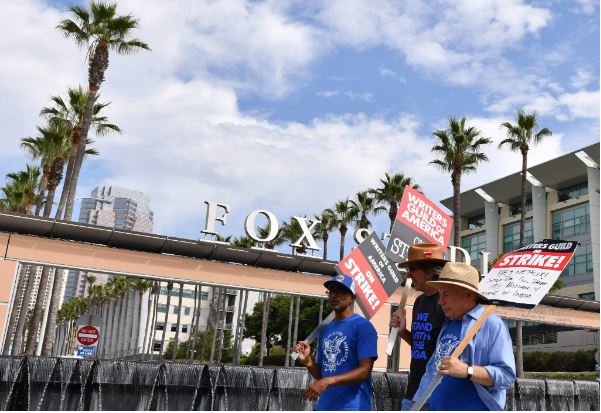The major entertainment studios took the unprecedented step on Tuesday night of publicly releasing details of their latest proposal to the union that represents 11,500 striking television and movie writers, in an apparent attempt to break a labour stalemate that has helped bring nearly all of Hollywood production to a halt.
The studios must decide whether to delay the release of high-budget pictures like “Dune: Part Two” until the following year, and if the network television schedule for the next 2023-2024 season can be saved or limited to reality programmes and repeats.
Several top executives from major Hollywood studios, including David Zaslav, head of Warner Bros. Discovery, and Robert A. Iger, head of Disney, met with officials from the writers’ union, the Writers Guild of America, shortly before the proposal was made public, according to three people briefed.
The corporations are effectively sidestepping the guild’s bargaining committee and appealing directly to the membership at large in the hopes that the attractiveness of their offer will put pressure on the guild’s leadership to accept it. Right away, there was pushback from authors like “The Dark Crystal: Age of Resistance” and “Person of Interest” creator David Slack.
The suggestions are “not only still inadequate,” Mr. Slack said on X (previously Twitter), but “an attempt by the bosses to divide our members,” he added. Don’t give in to the trap.
It’s been 113 days since the writers first went on strike. On August 11, talks between the studios and the authors restarted for the first time since early May. There has been hope ever since that the labour issues in the entertainment business could finally be ending.
The union’s executives indicated they will meet with the studios again this week in a statement released late last week.
The fact that the Alliance of Motion Picture and Television Producers, which negotiates on behalf of the studios, made its proposal public raises concerns that the parties may have once again struck a stalemate in their talks. The studio coalition has only infrequently published public remarks before the guild, and the studios and the writers’ union had agreed to abide to a media embargo while at the negotiating table.
Alliance chief negotiator Carol Lombardini stated in a statement that their current proposal “meets the priority concerns the writers have expressed.” “We are deeply committed to ending the strike and hopeful that the Writers Guild of America will work towards the same resolution.”
No quick response was received from a Writers Guild official when asked for comment.
Since striking screenwriters were joined by tens of thousands of Hollywood actors on July 14, Hollywood has been essentially shut down. Actors and writers alike have described the current climate as “existential,” claiming that the advent of streaming has led to a decline in both their quality of life on the job and their financial security.
Studios said their current proposal provided authors the “highest wage increase” in more than three decades, in addition to a long-contested increase in residuals. The studios also claimed to have provided “landmark protections” against AI and promised to make previously confidential statistics on streaming viewership available to the guild.
The studios claimed in their statement that they were “committed to reaching an equitable agreement to return the entertainment sector to what it does most effective: creating the TV shows and films that inspire and entertain audiences worldwide.”
